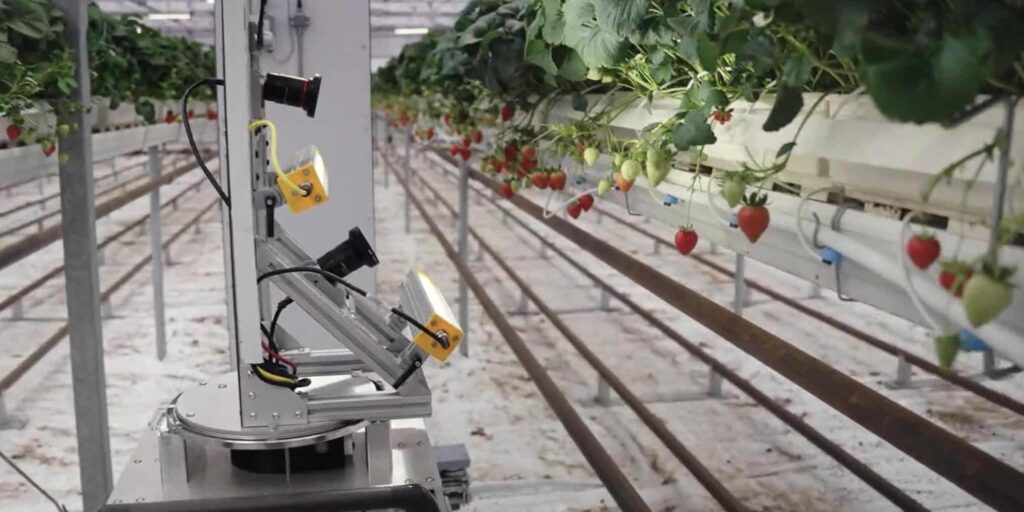With startup Zordi, founder Gilwoo Lee’s enthusiasm for robotics, healthy eating, better products and sustainable agriculture took root.
Lee hadn’t even finished his doctorate. in AI and robotics at the University of Washington when investors launched his ambitious plans for autonomous agriculture. Since Lee, a researcher turned entrepreneur, founded Zordi in 2020 with Casey Call, former head grower at vertical farming startup Plenty, the robot strawberry grower landed its fruit at Wegmans and is now expanding with partner farms in New Jersey and California.
“The most rewarding part is that the fruit you get tastes amazing,” Lee said. “You’re able to do it consistently throughout the entire plant cycle because you’re constantly optimizing. »
The company has two types of robots in its hydroponic operations. One is a recognition robot to gather information about plant health using fundamental patterns. The other is a harvesting robot to gently pick and place fruit and perform other tasks.
Zordi, whose engineering team is based outside of Boston, has farms in southern New Jersey and western New York. The company uses NVIDIA GPUs in the cloud and on desktops to train everything from crop health models to fruit picking and fruit quality assessment.
Lee aims to deploy autonomous greenhouse systems globally to support regional markets, reducing the carbon footprint associated with transportation and providing fresher, tastier fruit, grown more sustainably.
Having operated greenhouses in New York and New Jersey for two years, the company recently formed partnerships with greenhouses in New Jersey and California to meet growing demand.
Zordi brings NVIDIA’s AI-accelerated automation to indoor growing, which in many ways parallels developments in manufacturing and fulfillment operations.
Adopt Jetson for sustainable agriculture and energy efficiency
Zordi builds AI models and robots to enable sustainable agriculture at scale. It uses NVIDIA Jetson AGX Orin modules to test sensor data collection and run its models to recognize plant, flower and fruit health, early symptoms of pests and diseases, and hydration needs and nutrition, as well as light and temperature management.
Jetson’s power efficiency and availability of low-cost, high-performance cameras from NVIDIA partners are attractive assets for Zordi, Lee said. The company uses multiple cameras on each of its robots to collect data.
“Jetson is paving the way for many lower-cost cameras,” Lee said. “This allows us to play with different cameras and gives us better battery management.”
With its scouting and harvesting robots, Zordi also aims to solve a major problem that farms around the world are complaining about: a labor shortage that affects operations, leaving fruits and vegetables sometimes unattended and unattended. harvest.
Zordi plans to expand its growing operations to meet consumer demand. The company hopes to be able to do more with AI and robotic automation despite labor issues.
“We want our harvesting robots to perform more dexterous tasks, like trimming leaves, using simulation,” Lee said.
Omniverse Isaac Sim and Digital Twins to boost operations
Zordi is looking to bolster its indoor growing operations with AI, just as industrial manufacturers do, using Isaac Sim in Omniverse for simulations and digital twins to optimize operations.
The company’s software platform for visualizing all the data collected by its robots’ sensors provides a live dashboard with a spatial map. It provides a real-time view of each plant’s facilities to make it easier to monitor production remotely.
Additionally, it analyzes plant health and makes optional crop care recommendations using fundamental models so that inexperienced farmers can manage farms like experts.
“We’re literally one step away from putting all of this into Isaac Sim and Omniverse,” said Lee, whose Ph.D. the thesis focused on reinforcement learning and simulation in reality.
Zordi is working on gripping simulations for strawberries as well as cucumbers and tomatoes to expand to other categories.
“With strawberries or any other crop, if you can handle them gently, that contributes to a longer shelf life,” Lee said.
Lee is optimistic that Isaac Sim’s simulations will not only improve Zordi’s harvesting performance, but also allow him to perform other manipulation tasks in other scenarios.
Overall, Zordi aims to create a fully autonomous farming system that makes farming easy and profitable, with AI recommending sustainable crop care decisions and robots doing the hard work.
“What’s really important to us is how to automate that and how to have thoughtful AI that actually makes decisions for the farm with lots of automation,” Lee said.


